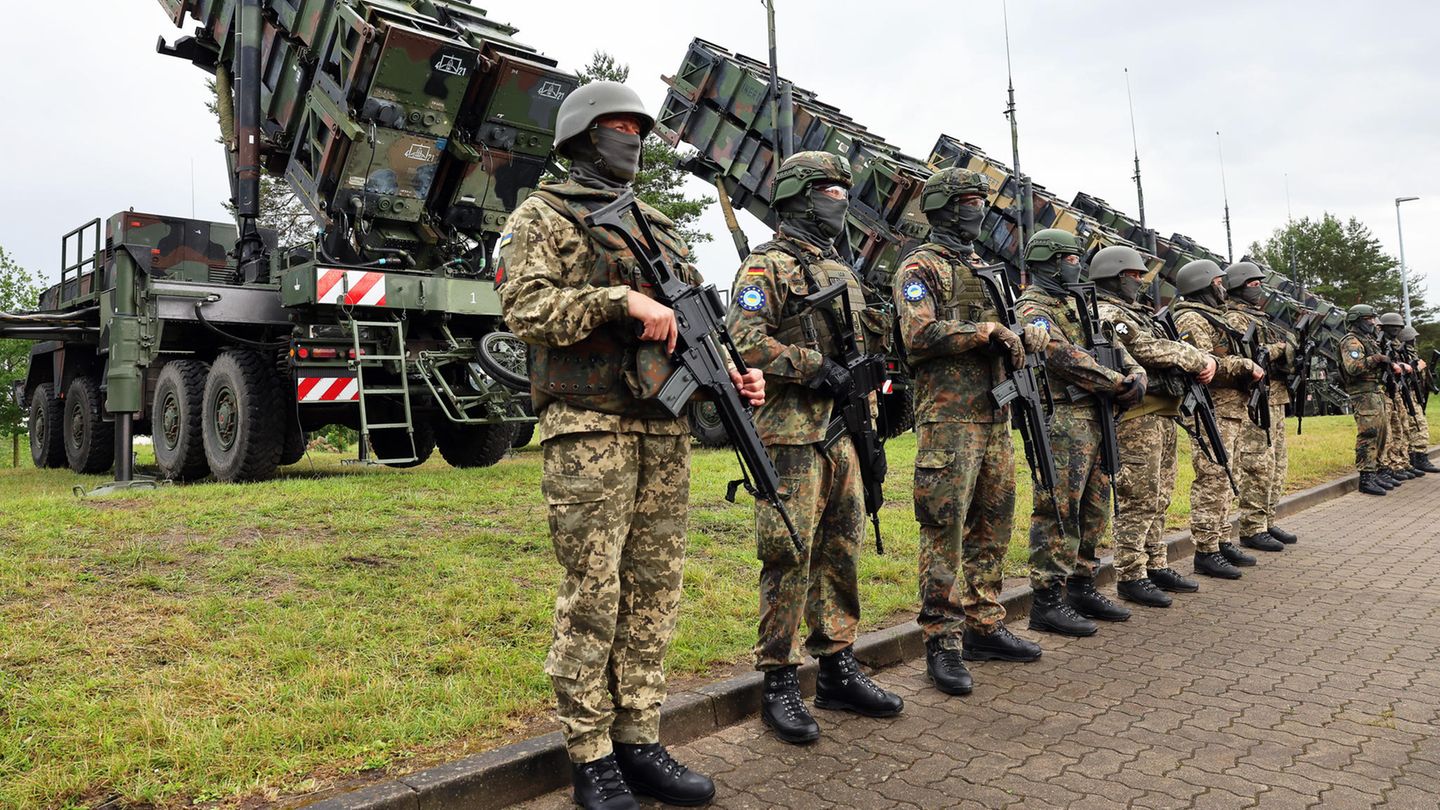Defence Minister Boris Pistorius’ proposals for a new military service were awaited with great interest. And now? Neither one thing nor the other – that is the tenor in many comment columns in German media. An overview of the press comments.
Mandatory medical examinations, compulsory questionnaires and a register of those fit for military service: Defense Minister Boris Pistorius (SPD) has presented a concept for a new military service – as a basis for quickly strengthening the Bundeswehr in the event of a defense situation. From 2025 onwards, 5,000 additional conscripts will initially be recruited each year from the pool of 40,000 candidates per year, and later more. “The aim is to let this number grow year after year and thus increase capacity,” said Pistorius. In the comment columns of the newspapers, people are not entirely convinced by the defense minister’s plans. The press review:
Press comments on Boris Pistorius’ conscription plans for the Bundeswehr
“Frankfurter Allgemeine Zeitung”: “The plans of (…) Boris Pistorius for a revival of conscription can at best be welcomed as preparation for it. It is a step in the right direction, but a baby step. (…) The spirit of change in the traffic light coalition did not even extend to the willingness to risk a change in the constitution. (…) With his plan, Pistorius limits the effort, and thus also the costs. This suits Scholz, who is already struggling to support the under-resourced Bundeswehr in other areas in order to remedy even more glaring deficiencies than the lack of new recruits. (…) Pistorius is therefore still a long way from his declared intention of making the country fit for war again. In order to actually move towards conscription, the coalition would have to have unpleasant debates, for example about military justice.”
“New Osnabrück Newspaper”: “Conscription does not mean being forced to do military service. The Basic Law states that no one is forced to serve in the armed forces against their conscience; and nothing can change that. Compulsory conscription of a year group and showing them the corresponding service options, as in Sweden, is therefore a viable option, and the SPD, Greens and Liberals should not unnecessarily put obstacles in the way of their defense minister. In addition, politics should not stop halfway and make women obliged too. This would require a change to the Basic Law, i.e. a two-thirds majority in the Bundestag. But anyone who wants to do justice to a ‘turning point’ – and equal treatment of the sexes – must have the courage to change.”
“Augsburger Allgemeine“: “A modern army is not necessarily as large as possible, but as capable as possible. A Eurofighter, for example, has 27 kilometers of cables and dozens of computers installed. In order to keep such aircraft in good shape, to counter the growing threat in cyberspace or to pilot a tank of the latest generation networked with other vehicles and units into battle, the Bundeswehr needs specialists. To trust that it can recruit these from an army of conscripts as in the past would be naive. The more demanding the tasks, the greater the competition for the best minds – and in this competition, the Bundeswehr today must be one thing above all: an attractive employer.”
“Frankfurter Rundschau”: “The discussion about the Bundeswehr’s personnel problems is being held under the slogan ‘conscription debate’ – but it should be clear that there must be no return to conscription, in which all 18-year-olds are condemned to compulsory service. The Bundeswehr does not need the majority of a year group, but only around 20,000 people in the long term, mostly qualified personnel for increasingly technical tasks. In view of the tensions in the world, it is sensible for as many people as possible to think about whether this is an option for their path in life. A questionnaire to all able-bodied men and women can be a suitable instrument for this. But this must under no circumstances be the first step towards a new conscription.”
“Badish newspaper” (Freiburg): “It is no secret that Boris Pistorius would have liked to initiate something bigger. But what the minister is now proposing is nothing more than a light form of conscription. (…) This is not a turning point in defence policy. It is a setback for Pistorius that the Chancellor and the SPD have not given him more leeway. (…) Germany definitely needs more soldiers and more reservists to be fit for war. Anyone who wants to make responsible policy must consistently pursue this goal.”
“Central German Newspaper” (Halle): “What is needed is a general military and civilian service requirement. There is a need for this far beyond the Bundeswehr. In addition, a service requirement could also counteract the widespread loss of solidarity. However, the rampant shortage of workers speaks against this. The Bundeswehr, on the other hand, no longer has the capacity to recruit entire generations. And in addition, the European elections have shown how deep the frustration of many young people is – even without compulsory service. Hardly anyone in the traffic light coalition wants a service requirement anyway. So either energetic steps towards recruiting military recruits will follow after the next election. Or Germany will dramatically lose its defense capability, which could have bitter consequences in view of the aggressiveness of Russian President Vladimir Putin.”
“North Bavarian Courier”: “Now Germany is once again discussing compulsory military service. The problems that stand in the way of such a move are described in detail. The discrepancy between the realization that one wants to strengthen one’s own defense capability and the ability to translate this realization into practical action could hardly be more obvious. Not only the army, but also society is not capable of defense.”
“The bell” (Oelde): “The model now presented by the Minister of Defense, which is intended to oblige young men to provide information about their willingness and ability to serve and to undergo a medical examination if selected, can only be a start. With the initial training of 5,000 recruits per year, Germany cannot become capable of defending itself by 2029, as Pistorius demands. In addition, this form of recruitment is likely to quickly trigger a debate about justice. What is needed is a general service to which both women and men of the same year group are obliged. This would have to extend not only to the Bundeswehr, but also to other important institutions such as rescue services and the Federal Agency for Technical Relief. Because in an emergency, there must also be sufficient forces available for civil defense.”
Tank construction
The Leopard 2 is considered one of the best battle tanks of our time
“Westphalian News” (Münster): “Anyone who is threatened must be able to defend themselves. For this, soldiers are needed as well as weapons. That is a truism. But soldiers are in short supply in Germany, just like other skilled workers. Even in more peaceful times, the number of troops fell short of NATO’s target. Now the times are less peaceful, so the pressure must be increased when recruiting. Pistorius’s ‘conscription light’ is probably effective in the short term, but ultimately the minister is falling short. A little obligation, but ultimately the free choice for or against military service: that may help to recruit a few thousand additional conscripts. The fact that this model excludes young women is a joke in times when equality is rightly demanded everywhere. A more fundamental, fairer and better would be a compulsory year for all young people. Not only, but also in the Bundeswehr.”
“General newspaper” (Mainz): “What works in Sweden does not necessarily work in Germany. (…) The Swedish model can at best be a stimulus. ‘Paper does not solve problems,’ says Bavaria’s Prime Minister Markus Söder. If citizens are to return in uniform to defend the country, there needs to be a real military service. And to do this, there needs to be a strengthening of the reserves and more attractive jobs for professional soldiers. None of these topics are discussed in peace-loving Germany. But Russia’s war teaches us that there are no pleasant alternatives.”

M3, Dachs, Leguan – what can the Bundeswehr’s special tanks do?
41:04 min
“Märkische Oderzeitung” (Frankfurt/Oder): “The truth is that Pistorius was held back by two realities: one is that of the troops, which simply would not be able to cope with a massive influx of tens of thousands of recruits per year. Instead of strengthening the army, a full military service would virtually paralyse it. The second reality is that of the coalition, right up to Chancellor Olaf Scholz. The Social Democrats, Greens and Liberals react to the word ‘duty’ with unequivocal rejection. Even the supposed super minister Pistorius was unable to break through this wall.”
“Straubinger Tagblatt/Landshuter Zeitung”: “There are other reasons against the reintroduction of conscription, even in a ‘light’ version – from the lack of majorities in the Bundestag to the lack of fairness. Conscription was suspended in 2011 not only because the times seemed so peaceful and the Bundeswehr was so expensive, but because even then only a fraction of each year group was actually drafted – a clear violation of the principle of military justice anchored in the Basic Law. Pistorius would also fall into this trap with a new conscription, because he ‘only’ has to fill a little more than 20,000 positions in the troops, but around 400,000 young men per year group who could potentially be drafted. The Bundeswehr can also become war-ready with volunteers.”
“Saarbrücken Newspaper”: “The question of whether the obligation to provide information planned by Pistorius must also apply to women is interesting. The Basic Law would have to be changed for this, but in 2024 there is no other answer to this question than a clear yes. In the interests of gender equality, this must be the case. The possible later tasks can of course vary – but this does not depend on gender, but on physical fitness.”
“Swabian Newspaper” (Ravensburg): “Defence Minister Boris Pistorius has proposed a questionnaire to justify a new military service model. It is questionable whether the concept will achieve its goal: to grow the Bundeswehr. There are currently 181,000 soldiers serving. The trend is declining. The aim is to have 203,000 men and women in 2031. NATO experts are even calling for 272,000 Bundeswehr members. In order to achieve these numbers, a general, fair military service obligation for men and women is called for, in which one must decide whether to serve in care, rescue services, in the ecological and social sectors or in the Bundeswehr. Only then will the Bundeswehr have a chance to present itself, advertise and grow. From the ‘sharp end’, we must think: 20,000 to 25,000 soldiers must be recruited every year so that Germany can credibly deter potential enemies and defend itself effectively in an emergency. Pistorius must reach this number. Appeals alone will not sufficient.”
Source: Stern
I have been working in the news industry for over 6 years, first as a reporter and now as an editor. I have covered politics extensively, and my work has appeared in major newspapers and online news outlets around the world. In addition to my writing, I also contribute regularly to 24 Hours World.




